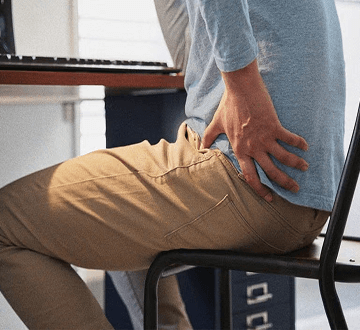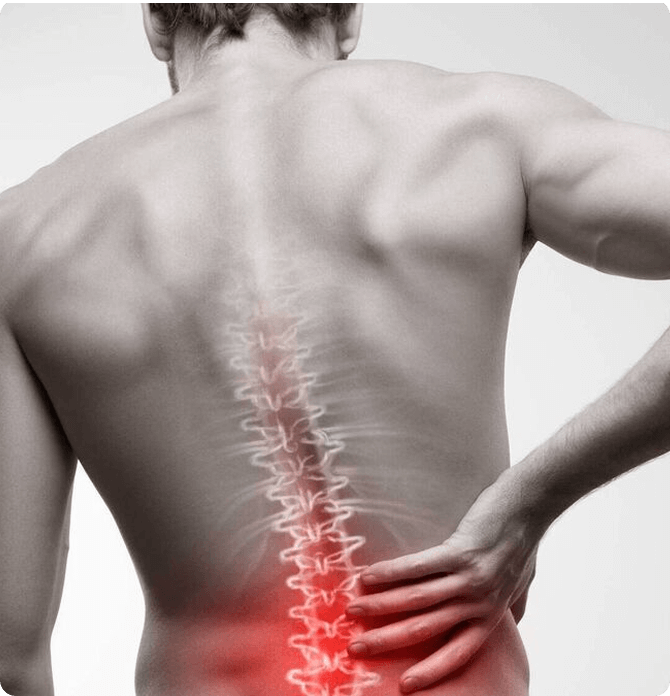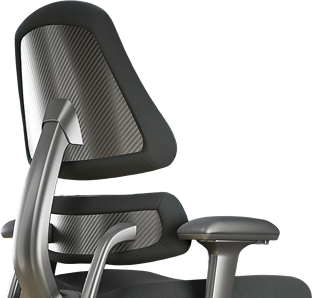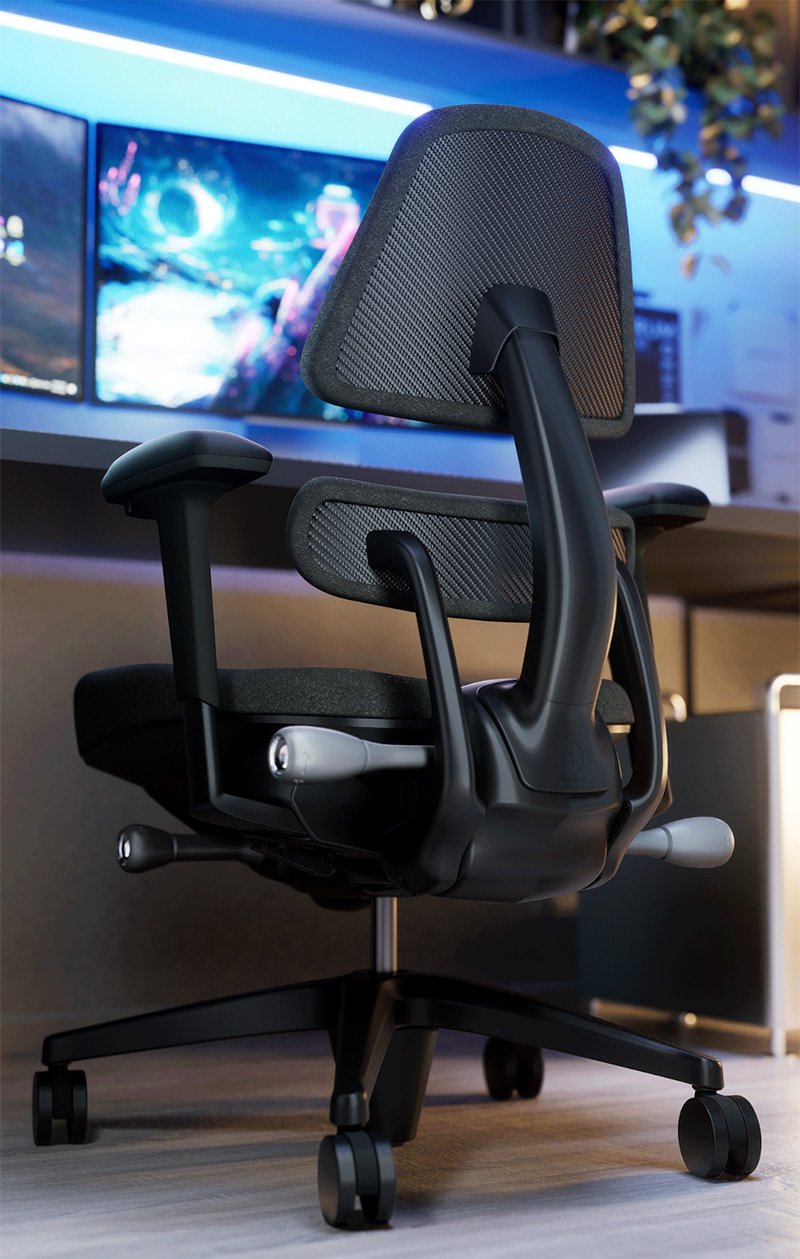
Leg Pain from Sitting? Here's Why It Happens—and How to Fix It
Why Do My Legs Hurt When I Sit?
If your legs ache, burn, or go numb while sitting, you’re not alone. Whether you're at a desk, driving, or relaxing at home, prolonged sitting in the wrong chair can strain your body in ways you might not realize.
What feels like a leg or knee issue often starts with poor posture and pressure higher up—particularly in your pelvis and spine.
More Causes of Leg Pain
Common Causes of
Leg Pain from Sitting
Common Causes of
Leg Pain from Sitting
Nerve Compression
(Sciatic or Femoral Nerve)
1
Slouching or posterior pelvic tilt while sitting increases spinal flexion, which can compress nerves exiting the lumbar spine—especially the sciatic nerve (L4–S3) and femoral nerve (L2–L4).
A study published in Spine found that prolonged lumbar flexion increases intradiscal pressure and can exacerbate nerve root compression, contributing to referred pain in the legs (Callaghan & McGill, 2001).
Piriformis Syndrome
2
When the piriformis muscle spasms or tightens, it can compress the sciatic nerve, producing pain that radiates down the leg.
Studies have shown piriformis syndrome may account for up to 6–8% of cases of sciatica (Hopayian et al., 2010), and poor seated posture is a known aggravator of the condition.
Circulation Restriction
Under the Thighs
3
Sitting with pressure on the underside of the thighs—especially when the seat pan is too high or long—can restrict blood flow and compress soft tissue.
Research from the International Journal of Industrial Ergonomics showed that high pressure under the thighs correlates with reduced venous return and increased lower-limb discomfort (Makhsous et al., 2005).
Muscle Imbalances and
Inactivity
4
Static sitting shortens hip flexors and weakens gluteal muscles, altering pelvic mechanics and increasing reliance on passive structures for support. Over time, this leads to poor alignment and muscular tension that can radiate pain down the legs.
Improper Chair Fit
5
Ergonomic mismatches—like too-deep seats or dangling feet—can place strain behind the knees or under the thighs. According to ergonomic design guidelines from NASA and NIOSH, seat depth, height, and contour play a significant role in reducing lower limb discomfort and circulation issues (NASA-STD-3000). Learn more about chair features that can cause leg pain here.

But before you blame your chair alone, take a second to think about your habits. Sitting with your legs crossed, your feet hanging, or tucked underneath you can all throw off your alignment and lead to leg pain. How you sit matters—keeping both legs aligned and your feet supported can go a long way in preventing discomfort.



Tips to Relieve Leg Pain from Sitting
If you're struggling with leg discomfort, try these practical tips:
- Adjust Your Chair Height so your feet rest flat on the floor and your knees are level with your hips.
- Use a Footrest if your chair is too high and can't be lowered.
- Tilt Your Pelvis Neutral to support the spine and avoid nerve impingement.
- Avoid Crossing Your Legs, which can compress nerves and restrict blood flow.
- Use a Contoured Seat Cushion to reduce pressure under the thighs and improve circulation.
- Take Standing Breaks every 30–60 minutes to move and stretch.
- Stretch Tight Muscles like the piriformis, hip flexors, and hamstrings regularly.
- Strengthen Core and Glutes to support posture and reduce strain on your lower body.
Anthros: The Chair Built to End Leg Pain from Sitting
Unlike most chairs that prioritize looks over function, Anthros is engineered to eliminate the root causes of seated leg pain—starting at the pelvis.
Supports and stabilizes your pelvis in a neutral position to stop slouching, reduce nerve tension, and align the entire spine and lower body.
The Anthros seat cushion is engineered to reduce hip and leg pain by supporting your body in a neutral pelvis position—the foundation of healthy sitting. Premium foam with Cloudfloat™ and Cloudtex™ technology is used to distribute pressure evenly, reducing stress on the legs while delivering stable, long-term comfort.
The Decompress Mode is designed to support your spine and relieve leg discomfort. Unlike traditional recline mechanisms, our tilt keeps the seat and back moving together—maintaining a neutral pelvis and optimal spinal alignment as you shift positions.
Unlike traditional seat sliders, the pelvis support adjusts to accommodate individual seat depths. Seat height can be adjusted to accommodate most traditional desk heights, and foot supports are available for purchase if needed.
Don’t Let Sitting
Steal Your Comfort
Whether your leg pain is dull, burning, or sharp, the right chair can make all the difference. The
Anthros chair is trusted by people who sit all day—and are done putting up with discomfort.
Sit better. Move better. Feel better—with Anthros.
Get My Free Posture Consult SHOP THE ANTHROS CHAIR60 Day Money Back Guarantee
CHAIR, SPECIALIZED OR ERGONOMIC: HSA ELIGIBILITY
CHAIR, SPECIALIZED OR ERGONOMIC: REQUIRES A LETTER OF MEDICAL NECESSITY (LMN) TO BE ELIGIBLE WITH A HEALTH SAVINGS ACCOUNT (HSA)
A specialized or ergonomic chair for treatment of a medical condition may be eligible if accompanied with a Letter of Medical Necessity (LMN) with a flexible spending account (FSA), health savings account (HSA) or a health reimbursement arrangement (HRA).
HOW DO I USE MY HSA/FSA ACCOUNT TO PAY FOR MY ANTHROS CHAIR?
Since every insurance carrier is different, the process of using your HSA funds will vary.
Call your HSA Administrator to learn the process for your carrier.
Potential processes:
- Get a LMN from a medical professional (MD, PA, NP, Chiropractor)
- Use your HSA/FSA to purchase your Anthros chair online
- Submit your LMN to your HSA/FSA provider
- Get a LMN from a medical professional (MD, PA, NP, Chiropractor)
- Pay out of pocket for your Anthros chair
- Submit receipt and LMN to your provider
- Get reimbursed from your HSA/FSA funds
Have more questions?

Join the Anthros family
Sign up to get special offers, the latest videos, news, + more!
*By signing up, I agree with the data protection policy of Anthros.
Info
Join our email list
Sign up to get special offers, the latest videos, news, + more.




